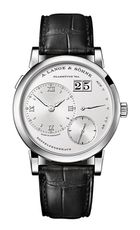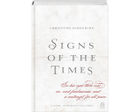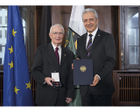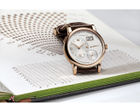Vorlage:In the news: Unterschied zwischen den Versionen
Sarah (Diskussion | Beiträge) Keine Bearbeitungszusammenfassung |
Keine Bearbeitungszusammenfassung |
||
| Zeile 9: | Zeile 9: | ||
<!-- ############### INHALT ################ --> | <!-- ############### INHALT ################ --> | ||
|<div style="padding:10px" align="left"> | |<div style="padding:10px" align="left"> | ||
'''Mythos and inspiration''' | |||
[[Datei:Lange 1 Ref 191 039 Five-Minutes Clock 2016 04.jpg|140px|right|The LANGE 1 in a white-gold case]] | |||
The new LANGE 1 in white gold is just around the corner | |||
Glashütte, February 2016 | |||
The [[LANGE 1]] owes its recognition to the asymmetric [[dial]] design and the prominent Lange outsize date. It was inspired by the [[Digitalanzeigende Fünf-Minuten-Uhr der Semperoper|five-minute clock in the Dresden Semper Opera House]], which, for 175 years, has been a hallmark of the world-famous operatic venue. | |||
Some ideas are so persuasive that they can survive catastrophes and retain their fascination even 175 years after they premiered. One of them is the five-minute clock in the Semper Opera House that displays the time digitally. Aloft over the stage, it indicates the time in an artistically framed double aperture: the hours in Roman numerals on the left, the minutes – in intervals of five – in Arabic numerals on the right. Every evening, the operagoers wait patiently for the minute display to switch from 55 to the blank white field, because the performances always begin at the top of the hour. | |||
When the Royal Court Theatre was inaugurated in [[1841/en|1841]], this technical marvel was considered a sensation, and, for its inventor, [[Johann Christian Friedrich Gutkaes]], it resulted in his appointment to court clockmaker. Together with his employee [[Ferdinand Adolph Lange]], Gutkaes completed the exceptionally large tower clockwork with two counter-rotating wheels and ... | |||
[[Mythos and inspiration|>>> more >>>]] | |||
<br style="clear:both;" > | |||
---- | |||
'''Signs of the times''' | '''Signs of the times''' | ||
[[Datei:Signs of the times (Novel) Christoph Scheuring.jpg|140px|right|Signs of the times (Novel)<br>Author: Christoph Scheuring]] | [[Datei:Signs of the times (Novel) Christoph Scheuring.jpg|140px|right|Signs of the times (Novel)<br>Author: Christoph Scheuring]] | ||
| Zeile 72: | Zeile 90: | ||
[[Watch legend, second generation|>>> more >>>]] | [[Watch legend, second generation|>>> more >>>]] | ||
<br style="clear:both;" > | <br style="clear:both;" > | ||
Version vom 24. Februar 2016, 01:03 Uhr
| IN THE NEWS | ||
|---|---|---|
| News archive 2025 << News archive 2026 >> All news | ||
Mythos and inspiration  The new LANGE 1 in white gold is just around the corner Glashütte, February 2016 The LANGE 1 owes its recognition to the asymmetric dial design and the prominent Lange outsize date. It was inspired by the five-minute clock in the Dresden Semper Opera House, which, for 175 years, has been a hallmark of the world-famous operatic venue. Some ideas are so persuasive that they can survive catastrophes and retain their fascination even 175 years after they premiered. One of them is the five-minute clock in the Semper Opera House that displays the time digitally. Aloft over the stage, it indicates the time in an artistically framed double aperture: the hours in Roman numerals on the left, the minutes – in intervals of five – in Arabic numerals on the right. Every evening, the operagoers wait patiently for the minute display to switch from 55 to the blank white field, because the performances always begin at the top of the hour. When the Royal Court Theatre was inaugurated in 1841, this technical marvel was considered a sensation, and, for its inventor, Johann Christian Friedrich Gutkaes, it resulted in his appointment to court clockmaker. Together with his employee Ferdinand Adolph Lange, Gutkaes completed the exceptionally large tower clockwork with two counter-rotating wheels and ...
 Author: Christoph Scheuring Glashütte, January 2016 A literary monument to Ferdinand Adolph Lange Christoph Scheuring’s historic novel entitled “Signs the times” was inspired by the fascinating personality of Saxony’s watchmaking pioneer. Ferdinand Adolph Lange was born in Dresden just over 200 years ago. Much has already been written about his accomplishments – the establishment of the precision watchmaking industry in Saxony and his determination to craft the world’s finest timepieces in the Ore Mountains. But little has been known about the first few years of his life so far. His rough-hewn father was a gunsmith who left the family early on. Lange grew up with foster parents who encouraged him in his ambitions and allowed him to study at the newly founded Royal Technical College ...
Walter Lange receives the Order of Merit of the Federal Republic of Germany  Glashütte, November 2015 The founder of Lange Uhren GmbH, Walter Lange, has been awarded the Order of Merit of the Federal Republic of Germany (First Class) by German President Joachim Gauck in recognition of his services to re-establishing Saxony’s watchmaking industry. The award was presented by Stanislaw Tillich, MinisterPresident of the Free State of Saxony, on 25 November at Saxony’s State Chancellery in Dresden. In his laudatory speech, the Minister-President of Saxony described Walter Lange as an entrepreneur who had shown extraordinary commitment to ensuring that German precision watchmaking found a new home in Glashütte. Thanks to his outstanding contribution, the town ...
The Sixties Iconic Collection – a tribute to a unique lifestyle Glashütte, September 2015 Glashütte Original combines strong colours with the fine art of watchmaking Sometimes a backward glance can inspire a decisive step forward. The Sixties Iconic Collection is a tribute to the unforgettable design of iconic timepieces from the 1960s. The special collection comprises five colourful watches in the unmistakable style of the popular Sixties line from Glashütte Original. In the 1960s, all around the world, a new way of looking at life blossomed. Music, art, design and technology were filled with inspiration and innovative power, introducing an era whose unmistakable style was to have a decisive impact on modern life. In eastern Germany, the German Democratic Republic (GDR) at the time, one also sensed the echo of this attitude towards life. Here, in the mid-1960s, the state-owned VEB Glashütter Uhrenbetriebe launched a wristwatch that was to become a true icon: the Spezimatic.
Watch legend, second generation  Glashütte, July 2015 The new LANGE 1 has arrived The history and the future of A. Lange & Söhne come together in the LANGE 1. In the year that marks the 200th birthday of Ferdinand Adolph Lange, its new movement is a fitting symbol of the brand’s determination to keep reinventing itself. The vision of the world’s finest watches from Saxony took shape during a long voyage. In 1837, it accompanied Ferdinand Adolph Lange,just 22 at the time, from Dresden to Paris, into Switzerland and back again. He recorded his observations ...
| ||
